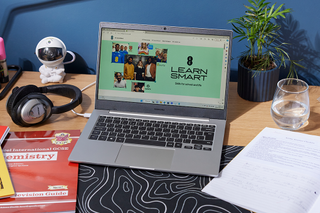7 fun ways to keep the kids learning over the summer holidays
If you’re worried about your child's learning going through ‘the summer slide,’ you’re not alone. Here’s how to keep their growing brains active and engaged all summer long.

Have you heard of the term ‘summer slide’? It’s real and describes the loss of knowledge our kids experience over the summer holidays when they’re not at school.
If you’re worried your child will lose all the valuable learning they’ve achieved over the year at school, you’re not alone. Many parents worry that their children forget critical parts of the curriculum and get frustrated during the autumn term. If you’re working, you’ll want to keep your kids busy over those long summer days. Don’t worry - our fun and creative ways to get kids learning over the holidays will help them avoid the dreaded summer slide. Plus, it’ll keep them busy and help them hit the ground running when school returns! What’s not to like about that?
Read on for brilliant ways to keep your kids’ brains engaged over the next six weeks. From bringing maths into the real world to using all the tools and tips that EE LearnSmart offers, we’ve got many ways to enrich your child’s learning while keeping them safe online.
7 fun ways to keep the kids learning over the summer holidays
1. Make maths part of everyday activities
Unfortunately the summer months are when many children forget the maths they’ve already learned. But daily practice can help your kid keep their maths brain active. There are loads of ways you can include maths in their everyday routine and even make it fun! Here are some easy ways to do it:
2. Set a summer reading programme
- Get your child to make a budget for their holiday spending or weekly pocket money. Thinking about how the costs of sweets, ice cream and comics can all add up will help their addition and subtraction skills and get them started on a great life skill.
- Point out deals in the supermarket, such as Buy One Get One Free or 50% off deals, and ask your child to work out how much each item is with the deal.
- When you go on a walk, take a sheet of paper and ask your child to create a tally chart showing how many butterflies, bees, or squirrels they spot.
If you can get your hands on a list of books your child will be reading at school the next year, you could get them started early. Or you could sit down and make a list with them of the books they’d like to read. You can even combine books and activities—once they’ve finished the book, watch the movie together as a special treat or visit something related to the story. Set some time aside to discuss the book with them, too, if you can.

3. Learn a new language together
If you’re lucky enough to be jetting off on holiday this summer, why not learn some of the local language before you go? Loads of free and paid-for apps can help you learn any language, from French and Spanish to Mandarin and Thai. These apps gamify learning a language, so they’re great fun. Plus, you get to feel smug knowing your child is on a device and learning something new! Take DuoLingo, for instance - it incentivises language learning with points, streaks, and leaderboards.
Even if you’re not going away, learning a new language is a brilliant way to keep your child’s brain active. Try watching a foreign language film or TV show with them, with the subtitles on, and see how many words they recognise.
4. Get scientific in the garden or the park
If you’ve got a garden or some outside space, encourage your child to help you plant flowers or vegetables. Ask them to Google what you’re planting and tell them how quickly it grows, whether you need to feed it, and how it can attract insects and butterflies. Bugs and creepy crawlies are another great way to keep young minds interested. Grab a magnifying glass and head out to your local park. Turning over a rock or a log can reveal all sorts of minibeasts. If your little one has learned about food chains, ask them to spot as many animals and insects as possible in the park, then create a food chain.
5. Keep a summer diary
Keeping a daily diary over the summer will help your child’s writing skills, help them become more confident and fluent in their handwriting, and improve their communication skills. Many children’s books include diary entries, from Diary of a Wimpy Kid to Tracey Beaker to Anne Frank, so it’s an excellent activity for kids of all ages. And don’t forget, you're not allowed a sneaky peek!
6. Find online games that gamify learning
Whatever the subject, there’s an online game or an app that can make it fun. Kids earn points, unlock levels, race against friends, and get rewarded for their progress.
Kahoot is a brilliant learning platform that turns educational content into fun quizzes and games. Making learning feel like a game instead of a chore works well for kids. They stay focused and absorbed without realising how much they’re learning. The game elements provide constant feedback, encouragement and chances to practise in a low-pressure environment.

7. Leverage tools at your fingertips, like EE LearnSmart
Learning in short, focused bursts can help kids concentrate better and remember 50% more information. EE LearnSmart takes advantage of this by providing tons of bite-sized educational content that kids and teens enjoy.
The platform is filled with fun, engaging activities and resources related to what your child is learning in school. There's Mad Science for exploring science concepts, Infinity Maths for practising maths and much more. Your child can even use Learn Smart to learn valuable coding skills or make digital cue cards.
Keeping kids engaged and learning during the long summer break doesn't have to be a chore. Getting creative and making education feel like fun games or activities can prevent the ‘summer slide’ while enriching your child's mind. With its variety of subjects, rewards, and game-like approach, EE LearnSmart can make avoiding summer learning loss an absolute breeze. So get prepared with an arsenal of tactics, and your child will happily continue developing their skills all summer long.
GoodtoKnow Newsletter
Parenting advice, hot topics, best buys and family finance tips delivered straight to your inbox.
Joanne Lewsley is mum to a tween, and freelance copywriter and editor who creates parenting, health and lifestyle content for evidence-based websites, including BabyCentre, Live Science, Medical News Today and more.
-
 Why do I crave sugar? Causes of sugar cravings and how to stop them
Why do I crave sugar? Causes of sugar cravings and how to stop themIf you're someone who suffers from sugar cravings you'll know how hard it is to give up the sweet stuff. But you're not alone.
By Debra Waters Published
-
 Low sodium diet: the benefits of reducing salt and what foods to eat
Low sodium diet: the benefits of reducing salt and what foods to eatBy Emily-Ann Elliott Published
